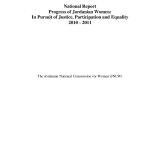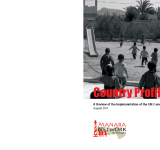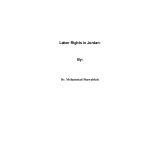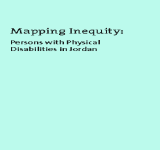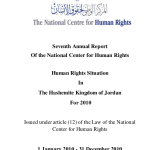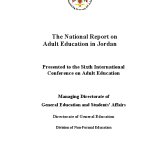This national report is designed to trace the progress of women in various fields;; monitoring achievements;; and highlighting gaps and failures;; as well as analyzing indicators;; recommending measures;; and measuring levels of achievements in the implementation of plans and strategies. The main themes were selected according to national priorities dictated by each stage: Legal Protection for Women's Right to Access Justice;; Participation;; the Economic Empowerment of Jordanian Women;; Equality;; Citizenship and Decision-Making in Public Life. The conclusions of this report confirm that a much smaller effort was exerted at the level of providing information;; data and the provision of services in the area of providing justice and facilitating ways of achieving it. The lack of knowledge about available services among women;; whether provided by civil society organizations or government institutions;; affects women's ability to access justice negatively. Regarding the economic participation the Policies and plans that targeted empowering women economically show that the result of these policies was weak and limited. Difficulty of women’s access to job opportunities in the private sector and inequitable pay between the sexes;; lack of supporting services to working women;; including childcare Facilities;; poor matching between education outputs and skills required in the labor market and the traditional social standards that contribute to directing females towards certain professions. The report proposed general recommendations and directions that include quick solutions to deal with the main highlighted challenges.
right
The country profile component of the Manara project is a rigorous and exhaustive report on the status of the implementation of the Convention on the Rights of the Child. It aims to be a resource for identifying gaps and challenges on the status of the implementation of the Convention;; to highlight the recommendations of the Committee on the Rights of the Child on specific matters;; and to identify commendable practices implemented by the State;; civil society and the international community in addressing these issues. The information was collected by exhaustive literature review and followed by field research involving a series of interviews with identified stakeholders;; government ministries and institutions;; local and INGOs;; academics;; unions and professional associations;; media;; religious authorities and United Nations agencies were contacted and interviewed. The structure of the study is based on the following themes: human rights;; children’s rights;; child labor and violence against children
This paper aims at shedding light on the labor rights in Jordan;; particularly for those who are working in the informal sector;; through identifying the factors that impede them from enjoying such rights and;; thus;; coming up with the appropriate recommendations in this area.
This report adopts a rights-based approach to map the access of persons with physical disabilities to social services in Jordan and assess the extent to which they enjoy equal opportunities and are socially integrated. The rights-based approach calls for a thorough assessment of the “4 A’s”;; i.e. the availability;; accessibility;; adaptability and acceptability of social services for all members of society. It thus puts special emphasis on the environmental factors and policy gaps constraining the “4 A’s” and preventing the social integration of vulnerable groups. Accordingly;; the objectives of this study are (a) to set forth the social;; legal and institutional barriers preventing persons with physical disabilities in Jordan from fully enjoying their right to education;; health;; employment and social protection and (b) to gauge the ability of social policies to lift these barriers and facilitate the overcoming of inequity for this group.
This annual report comes to diagnose the situation of human rights in the Hashemite Kingdom of Jordan in 2010;; and to point out the positive or negative changes that have occurred during that period. The report comprises the outcome of the accumulated experiences of the Center in the field of protecting civil;; political;; economic;; social and cultural rights. It also comprises a qualitative addition represented in the devotion of an axis related to the assessment of how serious the Government is in taking appropriate legislative;; judicial and executive measures needed to implement the recommendations by the treaty committees. The main themes are: Civil and Political Rights;; Economic;; Social and Cultural Rights;; Women's Rights;; Child Rights;; Rights of Persons with Disability;; Rights of the Elderly. The report proposes legislations;; policies and measures that are believed to contribute to changing the current situation of Human Rights for the better;; especially in the light of the rapid developments taking place in the Arab region.
This national report on Adult Education in Jordan;; is a report presented to the Sixth International Conference on Adult Education. It presents Jordanian educational legislation;; strategies;; policies and laws as well as educational projects and programs. The main theme of this report is the right of education.
